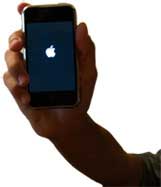The iPhone has cost me a lot of money and a lot of time spent at the Apple Store getting it fixed.
So why do I stick with it?
Since I first bought my iPhone last June, I’ve owned six iPhones mostly because I’ve had to get mine replaced due to some problem or other.
Is it worth the trouble to be an iPhone owner?
My six iPhones:
- My original iPhone had a flimsy connector port, and I replaced it right away.
- My second iPhone had its glass cracked after I dropped it on the floor. I paid $250 to get it replaced.
- The chrome on my third iPhone had a stain on it, which I considered unacceptable after paying $250 to get my old cracked iPhone replaced, so the Apple Store gave me a new one after I complained.
- I sold my fourth iPhone to buy a 16GB iPhone (my fifth), which I practically got for free.
- My 16GB iPhone released an echo in my voice that callers complained about, so I got another 16GB replacement.
- I now possess my sixth iPhone as I wait for the new 3G iPhone to be released soon.
Despite the problems, I stand behind the iPhone because it gives me one thing no other phone does: a blank slate.
The iPhone’s full-body touchscreen lets me create my own experience. With an (almost) fully-functional web browser, and soon-to-come third-party app support, the iPhone will one day be a canvas, to do with as I please.
Will iPhone 2.0 fudge it up?
iPhone 2.0 will be my seventh iPhone. It will likely add 3G, perhaps true GPS, and it will address some of iPhone’s many problems.
The new iPhone will be different, but what I have no doubt will remain central to the iPhone is its physical knack for constant evolution and adaptation to human desires; namely, its ‘blank slate’ quality.
The iPhone is a computer on a phone.
Why do you think there is a community of thousands of people Jailbreaking their iPhones and constantly demanding new apps and features?
The explosion of Jailbreak suggests to me that people will not let their technologies be restrained.
Apple responded to our demands with the third-party App Store (coming this month), but will that be enough?
As long as there is an empty canvas, people will want to fill it. As long as people have imaginations, they will envision new ways to use the iPhone. It is, as I said, a computer, full of unlimited potential.
That’s why, eventually, even past the upcoming App Store, Apple must step out of the way and let the people have their way with their blank slates.
That or be killed by Google’s Android, which with its open source framework will let us do exactly that.
An open source iPhone?
I’m not suggesting Apple reveal its source code and close up shop. It’s just that the human drive for change cannot be subdued, so Apple will eventually have to make the iPhone malleable enough to be molded by people’s individual tastes and preferences. If they don’t do that, someone else will.
Apple’s task should be to make the hardware work with our software, and to maintain a certain design consistency so that all our tools may work together.
We are sick of demanding new features for iPhone. There are plenty of people willing to work to make the iPhone a better platform, so let us!
Conclusion
The iPhone changed our culture. iPhone owners now expect to have a certain freedom on their mobile devices.
The challenge for Apple is this: Now that they have given us a sip of that freedom, we will only demand more.
If the iPhone is to continue to thrive, Apple must continue to quench our ever-growing thirst for mobile freedom by focusing on hardware and putting the iPhone’s software in the hands of the people. We are, after all, the ones who use it.
Step out of the way, Apple, cause we won’t be held back.
